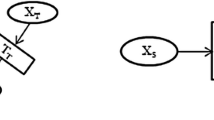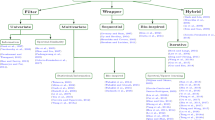Abstract
In this paper, a dynamical memory control strategy based on projection technique is proposed for kernel-based online regression. Namely, when an instance is removed from the memory, its contribution will be kept by projecting the regression function onto the subspace expanded instead of throwing it away cheaply. This strategy is composed of incremental and decremental controls. To the former, a new example will be added to the memory if it brings a significant change to the regression function, otherwise discarded by the projection technique. The latter is applied when a new instance is added to the memory, or the memory size has reached a predefined budget. The proposed method is analyzed theoretically and its performance is tested on four benchmark data sets.
Similar content being viewed by others
References
Bi T, Zhang B, Xu R (2011) Dynamics of intraday serial correlation in China’s stock market. Comm Stat-Simul Comput 40(10):1637–1650
Cesa-Bianchi N, Conconi A, Gentile C (2006) Tracking the best hyperplane with a simple budget perceptron. In: Proceedings of the 19th annual conference on computational learning theory, vol 4005. Springer, LNCS, Berlin, pp 483–496
Chang C, Lin C (2001) LIBSVM-a library for support vector machines. http://www.csie.ntu.edu.tw/~cjlin/libsvm
Crammer K, Kandola J, Singer Y (2003) Online classification on a budget. In: Thrun T, Saul L, Schölkopf B (eds) Advances in neural information processing systems, vol 16. MIT Press, Cambridge, pp 225–232
Crammer K, Dekel O, Keshet J, Shalev-Shwartz S, Singer Y (2006) Online passive–aggressive algorithms. J Mach Learn Res 7:551–585
Csató L, Opper M (2000) Sparse representation for Gaussian process models. In: Leen TK, Dietterich TG, Tresp V (eds) Advances in neural information processing systems, vol 13. MIT Press, Cambridge, pp 444–450
Cucker F, Zhou DX (2007) Learning theory: an approximation theory viewpoint. Cambridge University Press, New York
Dekel O, Shalev-Shwartz S, Singer Y (2007) The Forgetron: a kernel-based perceptron on a budget. SIAM J Comput 37(5):1342–1372
Downs T, Gates KE, Masters A (2001) Exact simplification of support vectors solutions. J Mach Learn Res 2:293–297
Engel Y, Mannor S, Meir R (2004) The kernel recursive least-squares algorithm. IEEE Trans. Signal Process 52(8):2275–2285
Ferrari S, Bellocchio F, Piuri V, Alberto Borghese N (2010) A hierarchical RBF online learning algorithm for real-time 3-D scanner. IEEE Trans Neural Netw 21(2):275–285
Freund Y, Schapire RE (1999) Large margin classification using the Perceptron algorithm. Mach Learn 37(3):277–296
He W (2008) Forecasting electricity load with optimized local learning models. Int J Elec Power Energy Syst 30(10):603–608
He W (2009) Limited stochastic meta-descent for kernel-based online learning. Neural Comput 21(9):2667–2686
He W, Wu S (2012) A kernel-based perceptron with dynamic memory. Neural Netw 25(1):106–113
Karasuyama M, Takeuchi I (2010) Multiple incremental decremental learning of support vector machines. IEEE Trans Neural Netw 21(7):1048–1059
Keogh E, Xi X, Wei L, Ratanamahatana CA (2006) The UCR time series classification/clustering. http://www.cs.ucr.edu/eamonn/time_series_data/
Kivinen J, Warmuth M (1997) Exponentiated gradient versus gradient descent for linear predictors. Inf Computat 132(1):1–64
Kivinen J, Smola AJ, Williamson RC (2004) Online learning with kernels. IEEE Trans Signal Process 52(8):2165-2176
Liang NY, Huang GB, Saratchandran P, Sundararajan N (2006) A fast and accurate online sequential learning algorithm for feedforward networks. IEEE Trans. Neural Netw. 17(6):1411–1423
Orabona F, Keshet J, Caputo B (2009) Bounded kernel-based online learning. J Mach Learn Res 10:2643–2666
Ozawa S, Roy A, Roussinov D (2009) A multitask learning model for online pattern recognition. IEEE Trans Neural Netw 20(3):430–445
Schölkopf B, Herbrich R, Smola AJ (2001) A generalized representer theorem. In: Proceedings of the 14th annual conference on computational learning theory, vol 2111. Springer, LNCS, Berlin, pp 416–426
Shalev-Shwartz S, Singer Y (2007) A primal–dual perspective of online learning algorithms. Mach Learn 69(2–3):115–142
Shalev-Shwartz S, Singer Y, Srebro N (2007) Pegasos: primal estimated sub-gradient solver for svm. In: Proceedings of the 24th international conference on machine learning, Corvalis, pp 807–814
Wang Z, Crammer K, Vucetic S (2010) Multi-class pegasos on a budget. In: Proceedings of the 27th international conference machine learning, Haifa, pp 1143–1150
Xu J, Kannan D, Zhang B (2001) Optimal dynamic control for the defined benefit pension plans with stochastic benefit outgo. Stoch Anal Appl 25(1):201–236
Xu Z, Zhang R, Jing W (2009) When does online BP training converge? IEEE Trans Neural Netw 20(10):1529–1539
Yang H, Xu Z, King I, Lyu M (2010) Online learning for group Lasso. In: Proceedings of the 27th international conference on machine learning, Haifa, pp 1191–1198
Zhang K, Kwok JT (2010) Clustered Nystrom method for large scale manifold learning and dimension reduction. IEEE Trans Neural Netw 21(10):1576–1587
Zhang H, Wu W, Liu F, Yao M (2009) Boundedness and convergence of online gradient method with penalty for feedforward neural networks. IEEE Trans Neural Netw 20(6):1050–1054
Acknowledgments
Zhang’s research was partially supported by the Fundamental Research Funds for the Central Universities, the Research Funds of Renmin University of China (10XNL007). Jiang’s research was partially supported by the NSFC (71071155).
Author information
Authors and Affiliations
Corresponding author
Rights and permissions
About this article
Cite this article
Jiang, H., Zhang, B. Dynamical memory control based on projection technique for online regression. Soft Comput 17, 587–596 (2013). https://doi.org/10.1007/s00500-012-0929-y
Published:
Issue Date:
DOI: https://doi.org/10.1007/s00500-012-0929-y




